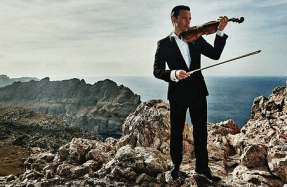A Walk with Holst


In August 1927, Gustav Holst received an invitation to have lunch with author Thomas Hardy, to whom he had recently dedicated his orchestral work Egdon Heath. Taking the train as far as Bristol, the composer then walked the rest of the way to Hardy’s house – in Dorchester, more than 60 miles away.
That was fairly typical, as Holst walked everywhere: up and down hills with friends such as Vaughan Williams; to and from work; on holiday in north Africa; all the way from Gloucestershire to London. This was partly due to being penniless, partly for the good of his health, but largely out of sheer enjoyment.
What better way to honour his memory, then, than the Gustav Holst Way, a walking trail across the Cotswolds that was officially marked out in 2011? Beginning in the village of Cranham, it makes its way past Holst’s birthplace in Cheltenham before heading eastwards towards another village, Wyck Rissington.
If a 53-year-old Holst can manage a 60-mile walk to Dorchester, then a gaggle of six 40- and 50-somethings can surely cope with 36 miles of Gustav Holst Way. I invite five friends to do just that. And, while none of my fellow walkers are hugely into classical music, this is my opportunity to try and change that.
You’re reading a preview, subscribe to read more.
Start your free 30 days



